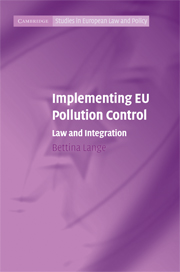Book contents
- Frontmatter
- Contents
- Series editors’ preface
- Acknowledgements
- Update on the IPPC Directive
- Abbreviations
- 1 Introduction
- 2 Traditional perspectives on the role of law in EU integration
- 3 Critical perspectives on the role of law in EU integration
- 4 What is EU ‘law in action’?
- 5 Talking interests – generating procedure: How political discourse constructs key aspects of BAT determinations in BREFs
- 6 Variation in open and closed BAT norms
- 7 What does it cost? Economic discourse in the determination of ‘the best available techniques’ under the IPPC directive
- 8 Does ‘law’ integrate? Licensing German and English coke ovens under the IPPC Directive
- 9 Conclusion
- Appendix: Methodology
- Bibliography
- Index
Series editors’ preface
Published online by Cambridge University Press: 07 August 2009
- Frontmatter
- Contents
- Series editors’ preface
- Acknowledgements
- Update on the IPPC Directive
- Abbreviations
- 1 Introduction
- 2 Traditional perspectives on the role of law in EU integration
- 3 Critical perspectives on the role of law in EU integration
- 4 What is EU ‘law in action’?
- 5 Talking interests – generating procedure: How political discourse constructs key aspects of BAT determinations in BREFs
- 6 Variation in open and closed BAT norms
- 7 What does it cost? Economic discourse in the determination of ‘the best available techniques’ under the IPPC directive
- 8 Does ‘law’ integrate? Licensing German and English coke ovens under the IPPC Directive
- 9 Conclusion
- Appendix: Methodology
- Bibliography
- Index
Summary
Implementing EU Pollution Control is an important book contributing to the sociology of (EU) law. It combines a radical reconceptualisation of the relationship of law and integration in the context of EU integration studies, drawing upon the sociological and critical theories, with an extended case study looking at the ‘law in action’ in the environmental field. Eschewing ‘grand theories’ of European integration or of the role of law in European integration, it takes as its central question the role of law in European integration. However, it proceeds not by treating law as a static unchanging concept (the ‘law in the books’) but by focusing on the micro specifics of ‘law in action’, specifically the implementation of EU pollution control in the hands of national officials in Germany and the UK. The claim is not so much that law ‘integrates’ (or indeed that it does not), but rather that the issue of the role of law in the context of the social, economic and political processes occurring in relation to the EU is above all an empirical one, and not resolvable either by application of legal reasoning techniques or by grand theorising.
The book is therefore an important step forward in analysis, combining both a rigorous theoretical framework with detailed and careful empirical work, based on extensive interviews with pollution control officials in the UK and Germany.
- Type
- Chapter
- Information
- Implementing EU Pollution ControlLaw and Integration, pp. xi - xiiPublisher: Cambridge University PressPrint publication year: 2008

